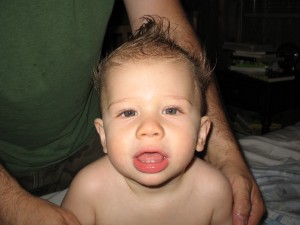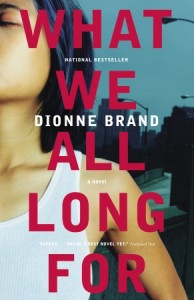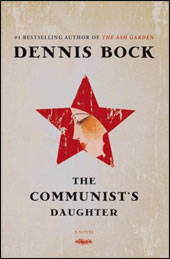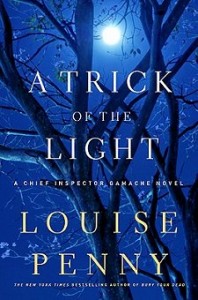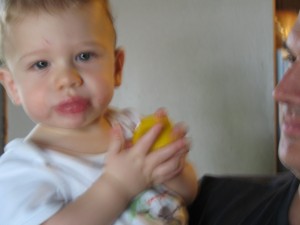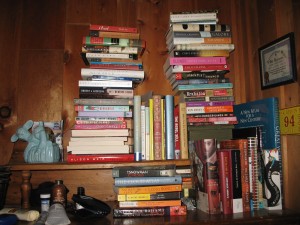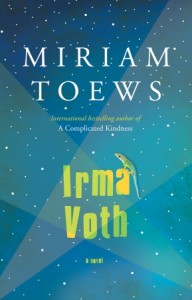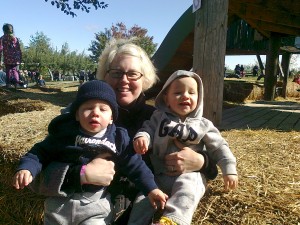 Today, the RRBB went to daycare for the first time for an entire day. By himself. Without my RRHB as a buffer (he did three transition “days” last week where he left him for a half-hour to get used to the environment). I was crushed. I was immediately struck down with guilt for being excited to go back to work. To be excited to be back at work. And then I had to remind myself that daycare is exceptionally good for the baby. He’s around other kids. He gets to learn in a wonderful environment taught by people who truly enjoy the company of these incredible little critters. But when I picked him up on Monday from his first full day, my heart almost collapsed because he was so upset. His teacher said it’s a fairly typical response: when other parents arrive and a child’s hasn’t arrived, they panic and freak out.
Today, the RRBB went to daycare for the first time for an entire day. By himself. Without my RRHB as a buffer (he did three transition “days” last week where he left him for a half-hour to get used to the environment). I was crushed. I was immediately struck down with guilt for being excited to go back to work. To be excited to be back at work. And then I had to remind myself that daycare is exceptionally good for the baby. He’s around other kids. He gets to learn in a wonderful environment taught by people who truly enjoy the company of these incredible little critters. But when I picked him up on Monday from his first full day, my heart almost collapsed because he was so upset. His teacher said it’s a fairly typical response: when other parents arrive and a child’s hasn’t arrived, they panic and freak out.
My whole world right now is conflicting emotions. I am elated to have a portion of my life back. The working me loves to be working. I adore using my mind and I have a really interesting job at the moment. Working in publishing has its challenges and rewards, but being on the frontline of the ebook revolution is akin to being on the frontline of the digital revolution when I first started working in websites over a decade ago. I get high from the newness of it all — I like the “wild west” feeling of each day (I know that’s a lame analogy but you know what I mean?). Yet, I’m completely and totally overwhelmed by how much my job has changed in a year and how much of a learning curve there seems to be. I’m terrified everyone will discover I honestly have no qualifications to do what I’m doing. Well, I have some credentials, a good work ethic among them. And then, I struggle with the emotions I feel on an almost minute-by-minute basis about missing the baby, and not just aching for the physical presence of him, but losing whole days where I used to be in constant contact. I’m not going to lie, every day last week I thought, “Well, now I’ve missed three days of my son’s life.”
Many working mothers I’ve surveyed have felt the same way. The question isn’t whether or not we’ll work. The question is how we’ll cope with the fact that we are working. One friend said that the first week would be horrible and then it would get better. My first day back was actually pretty terrific. That hyper-excited ‘back to school’ feeling permeated the entire day and it whizzed by. People were happy to see me. There’s an ease because, well, after being off for a year, I really didn’t have a lot of work to do. Essentially, it’s not a real work day. It didn’t seem like the transition would be all that hard. Oh, how foolish. Today was pretty rough. I had a late conference call and didn’t get home until after 7 PM. Not only did I miss the baby’s day, but I also missed his bedtime. And bedtime is my favourite time. We cuddle. We read stories. It’s the only time he’s a really cushy baby — for most of the other time he’s romping around like a Sendakian wild thing. And I missed it. All of it. There’s a sadness that creeps in around the time that I’m missing. People keep saying to me that it’s quality time and not quantity but at his age, I’m not sure if he can tell the difference. He needs consistency and calm because he’s a whirligig — he can’t tell that I’m sick or tired or frustrated — he only knows that I’m there to catch him when he turns around after crawling half-way up the stairs and decides he’s had enough.
So, to placate me, I think, my RRHB has agreed to do all kinds of ridiculously fun (IMHO) family-type things that neither of us would have imagined a part of our lives before we had the baby. We’ve been to two farms in three weeks, with petting zoos and tractor rides and bucketloads of kids, and then next weekend we’ll have our very first birthday party. I’m going to bake a cake. I’ve taken a day off of work to bake a cake. I know I’m no Tina Fey but I understand how these two important aspects of your life, your job and your role as mother, can have equal importance. I’m lucky that my workplace is so flexible. I went over to get the RRBB a bit early from daycare because I was worried about him and promptly brought him back to the office. That’s where he had dinner. I feel like it’s acceptable for us moms to do stuff like that — I’ve never seen a working dad bring a baby into the office unless it was accompanied by said baby’s mother. And the whole time we were there, I was telling the RRBB, “here’s where mummy works, here’s the books that she works on, here’s my computer and my window, and make sure you finish this food so you don’t get grumpy on the subway.”
I’m lucky to have a lot of vacation this year, which will help mitigate the guilt I have about only having two full days a week to spend with the baby. I’m already dreaming of taking a great vacation somewhere warm where I can equally introduce him to things that inspire his mummy: the ocean, the sunshine, big, tall trees, cobble-stoned streets and maybe a foreign language. Still, I have a horrible feeling I’m going to be playing catch up with my emotions and my parenting. Consistently trying to make up for the fact that I’m somewhere else for the majority of the day. Consistently trying to give him all of my attention for the few hours I do see him before and after I go to work. Greeting him with a smile and a delicious sense of joy even if he wakes up at 5 AM. Maybe that’s what people are talking about when it comes to quality. Or maybe I just need to take a deep breath and give it a bit more time before making all kinds of crazy pronouncements about my failure as both a mother and a publishing professional. Or, maybe, I just need a good cry.
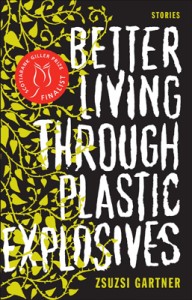 Short stories are epic and amazing things to read on the subway. They give you the false impression that they are “lighter” reading than novels because of their length, but I’ve been finding that so many of the collections I’ve read as of late pack an emotional punch that knocks me out after ten rounds a-la the Ali rope-a-dope, and none walloped me harder than Better Living Through Plastic Explosives by Zsuzsi Gartner.
Short stories are epic and amazing things to read on the subway. They give you the false impression that they are “lighter” reading than novels because of their length, but I’ve been finding that so many of the collections I’ve read as of late pack an emotional punch that knocks me out after ten rounds a-la the Ali rope-a-dope, and none walloped me harder than Better Living Through Plastic Explosives by Zsuzsi Gartner.